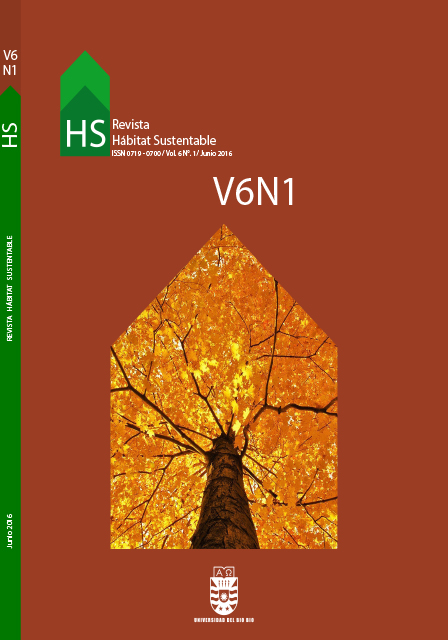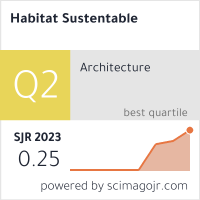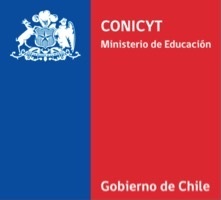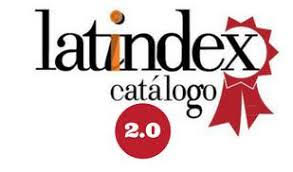The potential of active solar systems on dwelling roofs
DOI:
https://doi.org/10.22320/07190700.2016.06.01.05Keywords:
single family dwelling, solar energy potential, roofing, thermophotovoltaic architectural integrationAbstract
This paper presents an analysis of the geometric characteristics of roofs in recently-built, single family dwellings in housing developments in Concepcion, Chile, and their solar energy collection potential. Data was recorded for 2,139 houses built after 2006, which corresponds to 68.28% of the total number of possible dwellings. It was found that the average surface area of sloped roofs is 84.7 m2 and is divided between three and twelve wings or gables, with an average incline of 37.48°. These result in at least one primary or secondary wing with an average surface of 33.9 m2 facing north, east or west. This surface receives a total annual solar radiation of from 954 kWha/m2 to 1,732.8 kWha/m2 depending on the azimuth and the roof ́s slope. With the integration of photovoltaic panels, an average of 6,317.2 kWha per year, per house can potentially be produced. Additionally, when extreme cases were studied, including those with the largest and smallest roof surface areas, it was demonstrated that the energy produced would supply sufficient electricity with the integration of photovoltaic technology. Lastly, the potential of hybrid thermalphotovoltaic (PV/T) air technology is evaluated.
Downloads
References
ASTEA, Niccolò; DEL PEROA, Claudio y LEONFORTEA, Fabrizio. Optimization of solar thermal fraction in PVT systems. Energy Procedia [en línea], 2012, vol. 30, pp. 8–18. [Consultado 15 mayo 2016]. DOI 10.1016/j.egypro.2012.11.003.
CÁMARA CHILENA DE LA CONSTRUCCIÓN (CCHC). Balance de la Vivienda en Chile [en línea]. Santiago de Chile, 2014. [Consultado 9 mayo 2016]. Disponible en: http://www.cchc.cl/ uploads/archivos/archivos/Balance-de-la-Vivienda-2014.pdf
CASEN. Reportes Estadísticos Comunales [en línea], 2009. [Consultado 9 mayo 2016]. Disponible en: http:// reportescomunales.bcn.cl/2012/index.php/Concepción#Poblaci. C3.B3n_total_2002_y_proyectada_2012_INE
CORPORACIÓN DE DESARROLLO TECNOLÓGICO (CDT). Sistemas Solares Térmicos [en línea], CDT, 2007. [Consultado 15 mayo 2016]. Disponible en: http://informatica.cdt.cl/documentos/ publicaciones/index.php?opcion=publicaciones
CORPORACIÓN DE DESARROLLO TECNOLÓGICO (CDT).
Estudio de Usos Finales y Curva de Oferta de Conservaci n de la Energía en el Sector Residencial de Chile. Santiago de Chile, 2010.
CELIS, Flavio; GARCÍA, Rodrigo; TREBILCOCK, Maureen; ESCORCIA, Olavo y DÍAZ, Muriel. Análisis energético de las viviendas del centro-sur de Chile. Arquiteturarevista, 2012, vol. 8, pp. 62–75.
CHARRON, Rémi y ATHIENITIS, Andreas. Design and Optimization of Net Zero Energy Solar Homes (AE). ASHRAE Transaction, 2006, vol. 112, pp. 285–296.
CHOW, Tin Tai. A review on photovoltaic / thermal hybrid solar technology. Applied Energy [en línea], 2010, vol. 87, no 2, pp. 365–379. [Consultado 20 mayo 2016].DOI 10.1016/j. apenergy.2009.06.037.
DIRECCIÓN DE OBRAS MUNICIPALES DE CONCEPCIÓN. Sistema de Catastro Municipal Electrónico [en línea], 2015. [Consultado 24 octubre 2015]. Disponible en: http://200.68.12.118/ SigDom_comps/SigDom.phtml
GAJBERT, Helena. Solar thermal energy systems for building integration [en línea]. Lund University, 2008. Disponible en: http:// www.ebd.lth.se/fileadmin/energi_byggnadsdesign/images/ Publikationer/Lic_avhandling_HG_G5_web.pdf
HACHEM, Caroline, Investigation of Design Parameters for Increased Solar Potential of Dwellings and Neighborhoods. Concordia University, 2012.
HASTINGS, S. Robert y WALL, Maria. Sustainable Solar Housing: Volume 2 - Exemplary Buildings and Technologies. London & Sterling VA: Earthscan, 2007.
INTERNATIONAL ENERGY AGENCY (IEA), Cities, Towns & Renewable Energy Cities, Towns [en línea]. París: IEA/OECD, 2009. [Consultado 11 abril 2016]. Disponible en: http://www.iea. org/publications/freepublications/publication/Cities2009.pdf
IEA SHC TASK 41, 2012, Solar Energy in Architecture. Integration criteria and guidelines [online]. Available from: http://leso2.ep . ch/solar/pdf/SolThePh.pdf
IZQUIERDO, Salvador; RODRIGUES, Marcos y FUEYO, Norberto. A method for estimating the geographical distribution of the available roof surface area for large-scale photovoltaic energy- potential evaluations. Solar Energy, 2008. vol. 82, n° 10, pp. 929– 939.
KALOGIROU, Soteris. Solar thermal collectors and applications. Progress in Energy and Combustion Science, 2004, vol. 30, pp. 231–295.
KUMAR, Rakesh y ROSEN, Marca. A critical review of photovoltaic- thermal solar collectors for air heating. Applied Energy [en línea], 2011, vol. 88, n° 11, pp. 3603–3614. [Consultado 15 mayo 2016]. DOI 10.1016/j.apenergy.2011.04.044.
LUKAČ, Niko y ŽALIK, Borut. GPU-based roofs’ solar potential estimation using LiDAR data. Computers and Geosciences, 2013, vol. 52, pp. 34–41.
LUND, Peter. Large-scale urban renewable electricity schemes - Integration and interfacing aspects. Energy Conversion and Management [en línea], 2012, vol. 63, pp. 162–172. [Consultado 4 mayo 2016]. DOI 10.1016/j.enconman.2012.01.037.
MINENERGIA. Norma Técnica que determina algoritmo para la veri cación de la contribución solar mínima de los Sistemas Solares Térmicos acogidos a la franquicia tributaria de la Ley No 20.365 [en línea]. 2009. Disponible en: http://antiguo.minenergia. cl/minwww/export/sites/default/02_Noticias/descargas_noticias/ Norma_Tecnica_Actualizada.pdf
MINISTERIO DE VIVIENDA Y URBANISMO (MINVU), Proyectos de Tipo de Viviendas [en línea]. 2012. Available from: http://www. minvu.cl/opensite_20111121172350.aspx
MUNARI, Cristina. Architectural Integration and Design of Solar Thermal Systems. COLE POLYTECHNIQUE F D RALE DE LAUSANNE, Switzerland, 2009. [Consultado 9 junio 2016]. Disponible en: http://www.bisolnet.ch/Munari%20Probst- nal.pdf
OBSERVATORIO HABITACIONAL MINVU. Estadísticas/ Variación anual de unidades y super cie de viviendas [en línea]. 2014. [Consultado 15 mayo 2016]. Disponible en: http://www. observatoriohabitacional.cl/opensite_20080122171157.aspx
OBSERVATORIO HABITACIONAL MINVU. Viviendas unidades y super cie según mes y comuna 2002-2013-3 [en línea]. 2015. [Consultado 4 mayo 2016]. Disponible en: http://www. observatoriohabitacional.cl/opensite_20080122171157.aspx
PELLAND, Sophie y POISSANT, Yves. An Evaluation of the Potential of Building Integrated Photovoltaics in Canada. Renewable Energy [en línea], 2006, p. 8. [Consultado 6 marzo 2016]. Disponible en: http://canmetenergy-canmetenergie.nrcan- rncan.gc.ca/fichier.php/codectec/En/2006-047/2006-047_OP- J_411-SOLRES_BIPV_new.pdf
SOLARWALL. PV/Thermal; Hybrid Solar Heating + Electricity [en línea]. 2015. [Consultado 3 marzo 2015]. Disponible en: http:// solarwall.com/en/products/pvthermal.phpSolarWall®
WALL, Maria; MUNARI PROBST, Maria Cristina; ROECKER, Christian; DUBOIS, Marie Claude; HORVAT, Miljana; JØRGENSEN, Olaf Bruun y KAPPEL, Karin. Achieving solar energy in architecture - IEA SHC Task 41. Energy Procedia [en línea], 2012, vol. 30, pp. 1250–1260. [Consultado 3 marzo 2015]. Disponible en: http:// www.sciencedirect.com/science/article/pii/S1876610212016542
Downloads
Published
How to Cite
Issue
Section
License
Copyright (c) 2016 Hábitat Sustentable

This work is licensed under a Creative Commons Attribution-ShareAlike 4.0 International License.
The content of articles which are published in each edition of Habitat Sustentable, is the exclusive responsibility of the author(s) and does not necessarily represent the thinking or compromise the opinion of University of the Bio-Bio.
The author(s) conserve their copyright and guarantee to the journal, the right of first publication of their work. This will simultaneously be subject to the Creative Commons Recognition License CC BY-SA, which allows others to share-copy, transform or create new materials from this work for non-commercial purposes, as long as they recognize authorship and the first publication in this journal, and its new creations are under a license with the same terms.











 Scientific Information Program/Concurso Fondos de Publicación de Revistas Científicas 2018/ Proyecto Mejoramiento de Visibilidad de Revistas UBB (Código:FP180007).
Scientific Information Program/Concurso Fondos de Publicación de Revistas Científicas 2018/ Proyecto Mejoramiento de Visibilidad de Revistas UBB (Código:FP180007).





